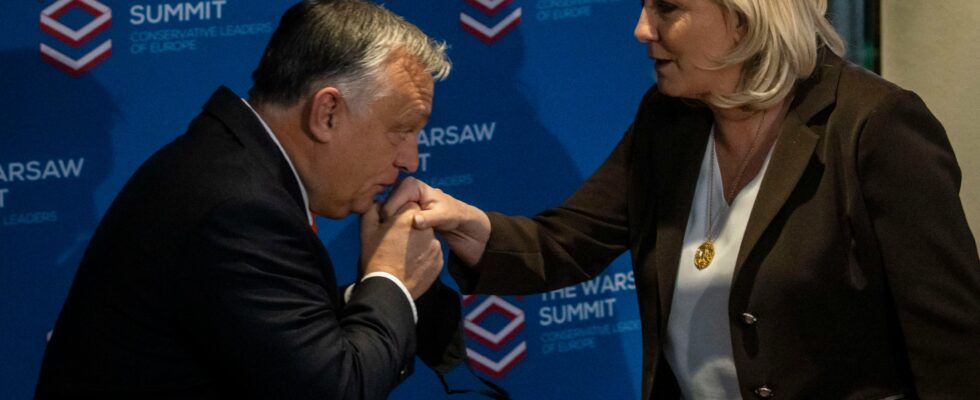Are we heading towards a grand alliance of far-right parties in the European Parliament? With some 190 elected members out of a total of 720 MEPs, the nationalist right now represents a large quarter of the total. This is why, in order to be able to weigh in on votes and debates but also on the legislative agenda, the Hungarian Prime Minister, Viktor Orban, wants to bring together as many as possible.
A bet that he has already half succeeded, since his new group, called “Patriots for Europe” should be able to form in the European Parliament, having gathered enough members with the Austrian far-right party and the centrist movement of the former Czech Prime Minister Andrej Babis. “We are taking the initiative to launch this new platform,” Viktor Orban declared last Sunday during a joint statement in Vienna alongside Andrej Babis and the Austrian Herbert Kickl, leader of the FPÖ.
Since then, five parties from different countries have announced their support: the Party for Freedom (PVV) of the Dutch Geert Wilders, the Portuguese Chega, the Spanish VOX, and – the last to announce their entry on Saturday – the Danish People’s Party and the Flemish far-right independence party Vlaams Belang.
As for the rallying of Marine Le Pen and Jordan Bardella’s National Rally, it should be confirmed or not this Monday, July 8, “after the second round of the legislative elections in France”, indicated Viktor Orban. If the RN decided to join the group, it would de facto take the lead in terms of numbers, with its 30 MEPs. For this new alliance launched by the Hungarian Prime Minister, the stakes are high, because “the more seats the party has, the more resources it receives to finance its action”, explains Jérôme Jamin, professor of political science at the University of Liège with the RTBF.
The de-demonization strategy in danger
The formation of the new group comes as Hungary has held the rotating EU presidency since Monday – already marked by a trip to Moscow by Viktor Orban which sparked an outcry in Brussels. Viktor Orban, whose Fidesz party has been among the non-attached since he left the European People’s Party (EPP, right) in 2021, hopes to make a different vision heard, against military support for Ukraine, against “illegal immigration” and for “the traditional family”. “A new era is beginning,” he proclaimed, adding that the faction “will change European politics”.
However, not everything is a foregone conclusion for Viktor Orban’s new group, as disagreements between far-right parties are frequent in the European Parliament. Until now, they sat in two different groups. On one side, ECR (the European Conservatives and Reformists Party) led by the “Fratelli d’Italia” party of the Italian head of government Giorgia Meloni. On the other, “ID” (Identity and Democracy), a group in which the National Rally sat until now. “For more or less thirty years, far-right parties have been trying to come together under a single banner. And each time, these alliances do not work,” Jérôme Jamin emphasizes to RTBF. And for good reason: they are plagued by profound disagreements on certain subjects. While their position on immigration, their racist, anti-Semitic and xenophobic remarks, as well as their security-oriented discourse bring them together, they are less in harmony on other subjects such as their relationship with Ukraine and Russia, or even religion.
Moreover, the head of the Italian government, Giorgia Meloni, has not yet shown her intention to join Viktor Orban’s new party, preferring to keep her seats in ECR, where she has the largest number of deputies and can thus lead the movement. The president of the Italian council, who has worked since her election to build the image of a constructive European at the table of European heads of state and government, intends to capitalize on this strategy and not to bother with politically radioactive partners, the newspaper emphasizes. The world.
“The RN and Les Patriotes are on the same line on all subjects, apart from the enlargement to the Balkans” that Viktor Orban defends out of “nostalgia for the Austro-Hungarian Empire”, affirms RN MEP Thierry Mariani in the columns of World. Before adding: “Relations are very good between Marine and Orban, they are old and based on trust.”
However, caution is still required at the National Rally, so as not to risk undermining its de-demonization initiative in the final stretch of the early legislative elections taking place this Sunday, July 7 in France. Hence an official announcement of whether or not to join the National Rally is planned for Monday, July 8.
